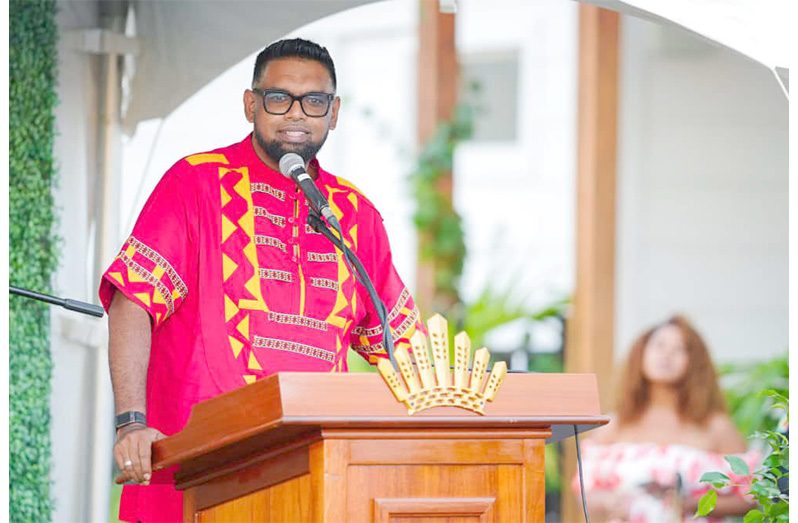–President Ali says, as Guyana eyes becoming regional data hub with establishment of a hyper-scale data centre
GUYANA could soon play a pivotal role in the global digital economy, as President Dr. Mohamed Irfaan Ali has touted plans to establish a hyper-scale data centre that could power Artificial Intelligence (AI) and digital services across the Caribbean.
The President made these remarks on Saturday at the opening of the modern SOMA Hotel and Restaurant, which is located at Houston, East Bank Demerara (EBD).
The President told the gathering that his government is actively advancing opportunities that would position Guyana with the technological evolution of the world, especially in the areas of AI, digitisation and data infrastructure.
“There is no slowing down, by the grace of God, for us in the next 10 to 15 years, because what we are doing is placing the ideas and the opportunities that will be accelerated in the world by 2035, today,” he said.
While 10 years ago, the global conversation was immersed in the energy dynamics, particularly that of fossil fuels, President Ali pointed to the significant shift that is happening today, which surrounds finding the energy to power AI.
“So, from that thought to today, where we don’t have the energy to power the future, because the data centres that must be built out because of the direction the world is going into to survive AI, digitisation and computing, requires scales of energy at unbelievable scale, and you have to achieve that scale of energy whilst you still have, for example, 50 per cent of the people in Africa without energy and energy poverty around the world,” he said, adding:
“Every country around the world knows that we have to invest in digitisation and in AI if we are to remain competitive.”
Speaking on the value creation of data centres, the Head of State painted the picture of Guyana having a hyper-scale data centre that can bring all of the innovation to Guyana; that can create the computing space for the entire region right in the country, that can be the sovereign storage space for the entire region.
The President added: “We’re talking about the build out of FinTech and all of these things. All of it is dependent; the entire modernisation and digitisation of the entire region is dependent on these investments.”
The projected cost of a data centre in Guyana that could serve the rest of the Caribbean, at a minimum could be US$2 billion to US$3 billion, the President disclosed.
“We can take the simple route to decide we just pay for these investments or make the sacrifice now; make the investment, have the investment, because these are not cheap investment,” Dr. Ali stated.
ELECTRONIC ID CARD
Just recently, President Ali announced that Guyana will begin the large-scale implementation and distribution of the electronic identification system.
The President also assured citizens that there will be public awareness and education as the government looks to roll out the initiative. Dr. Ali was the first to receive his E-ID back in August.
The biometric cards will not only offer citizens preferential treatment in certain areas, but will also strengthen border control by monitoring who is entering the country.
The cards will be important for daily transactions, including opening bank accounts, and are a critical part of Guyana’s wider digital transformation agenda.
In January, the border control and engagement system went live, and has since seen improved security at the airports and border crossings, and assured accuracy and reliability in the verification of travel using state-of-the-art technology and rigorous processes aligned with International Civil Aviation Organisation standards.
The government, too, is creating service centres in every region, where citizens can visit, conduct their businesses, and have queries handled within their home regions, eliminating the need to travel to Georgetown for government services.
Already, the government has begun the rollout of several innovative technology initiatives aimed at improving access to basic services, which has seen the country heading into a new era with several digital and artificial intelligence-led platforms aimed at improving access to government services and enhancing security.
Recently, the Ministry of Home Affairs announced that the country’s immigration support services have moved to a new digitised system.
This will reduce the need for in-person visits to offices, cutting and eventually eliminating long wait times, and streamlining a process that was done manually.












